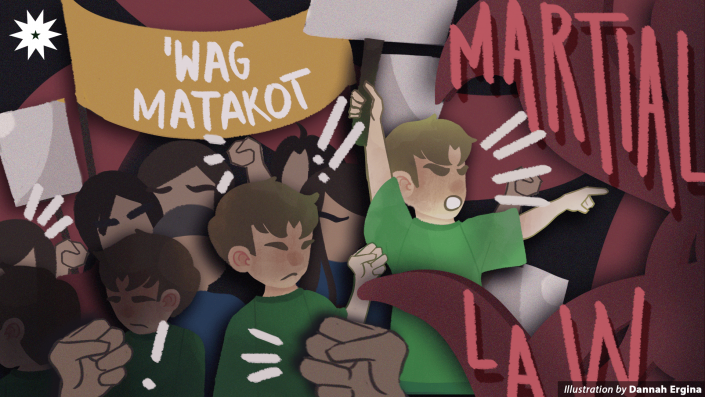September 21, 1972, the beginning of Martial Law—a day that aimed to mark the beginning of greatness and a restoration of order, yet for most Filipinos was the beginning of a dark chapter in history. This period of human rights violations, corruption, and widespread poverty would only end when the late dictator Ferdinand Marcos Sr. was ousted in what is now known as the EDSA People Power Revolution.

Many students, including those in big universities, triggered one of the strongest push backs in history. Lasallians joined the ranks of those seen and heard standing up against injustices. Today, the University Student Government (USG), among many Lasallian organizations, plays a significant role as the highest student governing body in orchestrating responses to crucial national affairs, especially under another Marcos administration.
The Lasallian during Martial Law
Back then, the University was not as overt or aggressive in its protests against the Marcos regime. There was no DLSU Commune or any other grand demonstrations such as those conducted by the University of the Philippines (UP) or Ateneo de Manila University. In fact, compared to these two universities, DLSU was not really in front of the national scene when it came to criticizing Martial Law—at first, at least.
This was demonstrated in the wake of the assassination of Benigno Aquino Jr. in August 21, 1983, where DLSU’s academic community was criticized for its seemingly feeble interest in the whole thing. The Lasallite, an ancient moniker for DLSU students, was labeled “indifferent,” “apathetic,” “unconcerned,” and even “selfish” by UP and Ateneo students—as described in a 1983 article of The LaSallian—and even DLSU professors and fellow Lasallites themselves. The USG’s predecessor, the Student Council, did not help this poor image with its belated reactions to the event. Many complaints were made on how it was dragging its feet on national issues.
This does not mean, however, that there were no demonstrations by the University at all. When the administration declared August 21 to be a holiday to commemorate the life of B. Aquino, various students, faculty, and administration members assembled in school and marched hand-in-hand to the Quirino Grandstand in 1984.
In 1986, things picked up as DLSU threw its support behind B. Aquino’s widow, Corazon Aquino. Sometime before the Tagumpay ng Bayan rally on February 16, around 800 people from DLSU participated in an anti-government rally at the Liwasang Pambansa. Lasallians helped the National Citizens’ Movement for Free Elections monitor 110 precincts, joined the human barricade at Camp Aguinaldo, engaged in an anti-fraud and anti-terrorism march that was a multi-sectoral mobilization of 1,000 people, and sent a delegation to a crowd of around 250,000 that rallied in support of C. Aquino. The latter delegation was led by the Student Council and the La Salle Students for Democratic Action.
Collective effort
Today, the USG and other Lasallian student organizations continue to make efforts to participate in national affairs, most especially in nation-building.
Current USG President Giorgina Escoto mentions that the USG’s initiatives are for the benefit of “entire communities beyond DLSU”. These initiatives include conducting meetings with government officials to “discuss pertinent issues” that students face on both local and national levels.
Escoto also adds that a Martial Law Elective is being institutionalized by the USG with the Arts College Government (ACG). Meanwhile, a permanent Martial Law Exhibit in the Taft campus is under discussion, in light of the commemoration of the Declaration of Martial Law’s 50th anniversary.
In observance of the same event, the USG had called for students to wear black last September 21, which helped spark more “On Wednesday, We Wear Black” stunts across various universities. This caught the attention of ex-National Task Force to End Local Communist Armed Conflict Spokesperson Lorraine Badoy, who took to right-leaning SMNI News Channel to air her enmity against the USG’s stunt, complaining that college students should think critically and avoid listening to groups affiliated with the CPP-NPA-NDF.
The USG later declared Badoy persona non grata over the statement. It was limited to USG activities and programs, and Chief Legislator Francis Loja did acknowledge that they do not have the jurisdiction to bar Badoy outside the USG. “But what we can do is to ensure that we don’t allow her to discredit the principles that the USG was built on, and that starts with prohibiting her from taking part [in] matters concerning DLSU USG,” Loja said in an earlier interview.
Escoto furthers, “As an organization, we have the power to speak up and actually be heard. It is our duty to empower the voices that are drowned out. It is our responsibility to ensure that good governance and the protection of human rights will be upheld for all Filipinos.”
Lasallian matters
The national elections in May earlier this year was one of the most recent reminders of the USG’s responsibilities in spearheading nation-building.
Students commend the USG for their continuous efforts in creating platforms that are tremendously timely, but concerns still arise with regard to prioritization. Comments seen online voice their worries on how the USG has been slow with University issues, such as the long-overdue conduction of the on-site graduation rites, all while other activities and projects were being prioritized. “USG can learn from these feedbacks by addressing such concerns right away with the assurance that students’ rights are of utmost importance to the institution,” Sam* (III, LGL) advises.
Nonetheless, Escoto asserts that the student government intends to keep an environment where students can speak against questionable politics. “The USG will remain a voice of the last, the lost, and the least especially during times that the administration will fail to do its job of serving the people.”
*Names with asterisk (*) are pseudonyms
